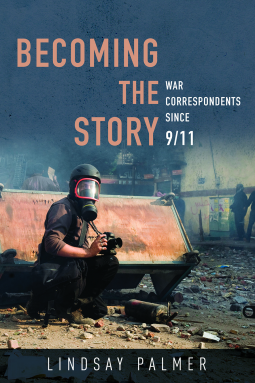
Becoming the Story
War Correspondents since 9/11
by Lindsay Palmer
This title was previously available on NetGalley and is now archived.
Send NetGalley books directly to your Kindle or Kindle app
1
To read on a Kindle or Kindle app, please add kindle@netgalley.com as an approved email address to receive files in your Amazon account. Click here for step-by-step instructions.
2
Also find your Kindle email address within your Amazon account, and enter it here.
Pub Date Feb 15 2018 | Archive Date Feb 02 2018
Talking about this book? Use #BecomingTheStory #NetGalley. More hashtag tips!
Description
The September 11 attacks produced sea changes in journalism and the lives of the people who practiced it. Foreign reporters felt surrounded by the hate of American colleagues for "the enemy." Americans in combat areas became literal targets of anti “U.S. sentiment. Behind the lines, editors and bureau chiefs scrambled to re-orient priorities while feeling the pressure of sending others into danger.
Becoming the Story examines the transformation of war reporting in the decade after 9/11. Lindsay Palmer delves into times when print or television correspondents themselves received intense public scrutiny because of an incident associated with the work of war reporting. Such instances include Daniel Pearl 's kidnapping and murder; Bob Woodruff 's near-fatal injury in Iraq; the expulsions of Maziar Bahari and Nazila Fathi from Iran in 2009; the sexual assault of Lara Logan; and Marie Colvin 's 2012 death in Syria. Merging analysis with in-depth interviews of Woodruff and others, Palmer shows what these events say about how post-9/11 conflicts transformed the day-to-day labor of reporting. But they also illuminate how journalists ' work became entangled with issues ranging from digitization processes to unprecedented hostility from all sides to the political logic of the War on Terror.
Lindsay Palmer is an assistant professor of global media ethics at the University of Wisconsin, Madison.
Advance Praise
"In most academic studies of post-9/11 war reporting, the challenges and risks that the ‘conflict correspondents’ face often get insufficient attention. Lindsay Palmer’s pioneering and commendable study fills a gap in journalism scholarship. Highly recommended."--Daya Kishan Thussu, author of News as Entertainment: The Rise of Global Infotainment
"Covering a war means going to places torn by chaos, destruction and death,' the late foreign correspondent Marie Colvin observed, 'and trying to bear witness' in order to 'find the truth in a sandstorm of propaganda.' Lindsay Palmer’s book honors this commitment, offering us a rigorously perceptive assessment of war reporting over the first decade since the September 11 attacks. Its case studies draw upon analyses of the news coverage, as well as extensive interviews with correspondents and their editors, to present important insights into what gets reported, how and why. Essential reading."--Stuart Allan, author of Photojournalism and Citizen Journalism: Co-operation, Collaboration and Connectivity
Available Editions
| EDITION | Paperback |
| ISBN | 9780252083211 |
| PRICE | $25.95 (USD) |
| PAGES | 224 |
Links
Average rating from 3 members
Featured Reviews
 Reviewer 132350
Reviewer 132350
4* Interesting and hard-hitting book about how journalism has changed post 911.
This book covers a ten-year period in international war reporting, starting immediately after 911. It is detailed, with facts that can be independently verified, with many of the featured journalists being household names.
The lengths reporters will go to for the story is clear from news bulletins but this reveals the sometimes lack of support from the news agencies/editors, and what reporters have to do for their own safety and for their willingness to be able to get THE story. It's sometimes graphic and it does feel as if there's point-scoring to a certain degree amongst agencies, and also countries.
An interesting read, and one that's filled me with a new appreciation for reporters.
ARC courtesy of University of Illinois Press and NetGalley, for my reading pleasure.
 Ryan M, Reviewer
Ryan M, Reviewer
This book covers the decade after 9/11 in journalism, specifically looking at war correspondents. The author focuses on certain high profile examples of journalists becoming the news (Daniel Pearl, Lara Logan, Bob Woodward, to name a few) and uses these examples to make some points about the state of war reporting since 9/11. There were some very thoughtful arguments made here and I learned quite a bit more about these incidents from the book.
I had a few issues with some words and phrases that appeared very frequently in the book along with the use of citations at the end of the sentence instead of using footnotes. This book read like a textbook or a college paper at times. Other than those quibbles, this was a very interesting book for people interested in the media and how stories of conflict around the world are covered.





